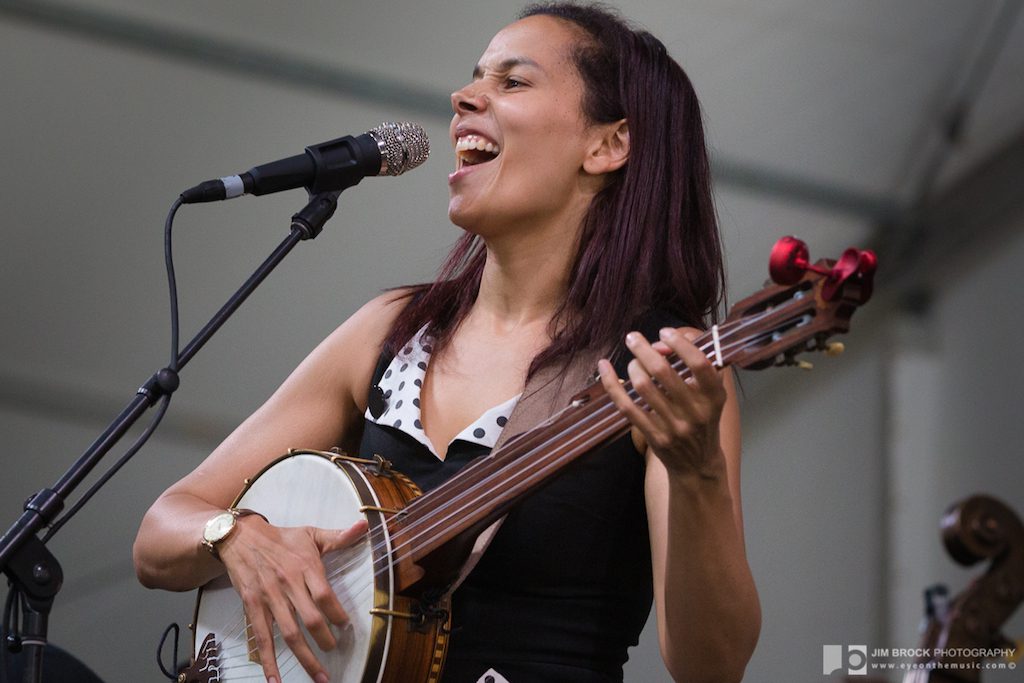THROUGH THE LENS: From Rhiannon Giddens to Sierra Ferrell, Singles in the Spotlight

Rhiannon Giddens - New Orleans Jazz Fest 2016 - Photo by Jim Brock
Singles — whether on 78 rpm records or “cassingles” or digital downloads — are nothing new. However, recently there has been an uptick in one-off tunes released by roots musicians. In this time of coronavirus, many folks may not have ready access to a full studio in order to record a complete collection of songs. But they’re still feeling creative and want to share their music. Additionally, as many of these songs are topical, addressing current social and political issues, time is of the essence.
This week’s column looks at some singles that have piqued my interest. All are available as downloads and/or on various audio and video streaming services. A very few are also available as 7-inch records. Most have been released within the past couple of weeks, and nearly all are: (1) Standalone songs unavailable on albums; and (2) released with proceeds going to support progressive social movements and organizations, such as Black Lives Matter, or the music community, such as Save Our Stages.
Rhiannon Giddens
Giddens has been quite proficient in collaborating with other artists, both inside and outside the roots community. Recently, she’s recorded Portishead’s “It’s a Fire” with Amanda Palmer, Bill Wither’s “Just the Two of Us” with Sxip Shirey, Nick Drake’s “Black Eyed Dog” with Ben Harper, and Bob Dylan’s “Forever Young,” for the finale of TV series Parenthood, with Iron & Wine’s Sam Beam. Additionally, she re-created her own “Cry No More” with composer Michael Abels (Get Out), members of the Met Opera Chorus, and the Nashville Ballet.
Giddens also debuted “Don’t Call Me Names,” an original song about rejecting toxic behavior, on the inaugural episode of Southern Craft Radio, ND contributor Kelly McCartney’s new show on Apple Music Country. And she released a cover of Daniel Lanois’ “Cruel World” that Willie Nelson first performed on the soundtrack for the video game Red Dead Redemption 2.
Mountain Man
This trio, consisting of Molly Erin Sarle, Alexandra Sauser-Monnig and Amelia Randall Meath, has also been busy. Since their 2018 album Magic Ship, they’ve recorded seven tunes in an ongoing series of cover singles from a wide assortment of writers and styles: John Denver, Wilco, Neil Young, Kacey Musgraves, the Shaker hymn “Simple Gifts,” and Irving Berlin’s “White Christmas.”
The Election, BLM, COVID-19, Abortion, and More
Emma Swift, not resting on the universal praise for her recent album of Dylan covers, is not one to rush a new song out into the world, but “The Soft Apocalypse” speaks to life in Trump’s America in the time of COVID-19, part confession, part protest.
Iris DeMent’s “Going Down to Sing in Texas” is a nine-minute opus addressing gun violence, corruption in the church, discrimination against Muslims, the war in Iraq, economic inequality in America, police brutality, racial justice, and more.
Amelia White’s “No Sound” galvanizes around George Floyd’s death, making the political personal, as death is ultimately a human thing.
Yola’s “Hold On” is an anthem to this generation’s young Black women showing what it is to be young, gifted, and Black.
Kimm Rogers’ “Lie,” a collaboration with Kelley Ryan, takes on Trump’s universe of “alternative facts” and his reinvention of reality.
Sunny War’s “Orange Man” eloquently lambastes the orange blob with music interspersed with DT’s own racist, jingoistic, misogynistic ramblings. There’s also a way cool video.
Fruition’s “For You”/“Stand With You” is a direct message to those continuously on the front lines of the fight for racial equality: “Though I will never understand the struggles that you’ve been through / I will do all I can and I’m gonna stand with you.”
Indigo Girls’ “Long Ride” was written and recorded for NPR Morning Edition’s Song Project, where musicians give their take on the COVID-19 era. It’s their first co-write with each other in nearly 20 years.
Rosanne Cash’s “Crawl Into the Promised Land,” with John Leventhal and Sarah Jarosz, expresses exhaustion and disorientation: “Deliver me from tweets and lies / and purify me in the sun.”
Will Hoge’s “Con Man Blues” addresses the carnival barker in charge, a direct charge against the country’s current leadership, their abject failures and obscene cruelty.
Amanda Shires’ “The Problem,” with Jason Isbell, represents a couple having an honest, difficult dialogue about abortion. Its release coincided with International Safe Abortion Day.
Emily Duff channels prime Lucinda Williams in “The Call,” her anthem to heed the call to vote: I’m mad as hell and I’m not gonna take it anymore.
Love Reigns
Sierra Ferrell‘s “Jeremiah”/“Why’d Ya Do It,” her first recorded music in nearly two years, is a delicious taste of what’s coming next year on a full-length album. Once you’ve heard her songs, grounded in traditional country with the soul of a gypsy, there is no way you will forget her. She’s a once-in-a-decade talent.
Kelley Ryan’s “Waiting For the Ocean” looks toward a return to peaceful normalcy, waves carrying us to our devotion. As Ryan said to me during a recent chat, “For me that is my beloved sea-cliffs in Ireland, but I figure everyone has their own personal ‘ocean’ that they long to return to. We won’t get there any sooner feeling fear and hate. Let us immerse ourselves in calm.”
Johnny Dowd’s “Hideaway,” a song about his mother, was a virtual reunion with his band: Justin Asher, Brian Wilson, Kim Sherwood-Caso, Anna Coogan, Mike Edmondson, Mike Stark, and honorary member Sally Timms. Even in a virtual world, Johnny is always Johnny.
Ida Mae’s “Raining for You” is a moving love song about losing yourself in the darker memories of a past romantic relationship.
Jesse Malin’s “Todd Youth”/“Sally Can’t Dance” (Lou Reed). As Malin said in a note, “Many of us have been missing our dancing days of letting loose to music we love in dark rooms full of strangers.” I second that emotion.
Now, of course, here are the photos.
- Rhiannon Giddens – Photo by Todd Gunsher
- Amanda Shires – Photo by Mark J. Smith
- Mountain Man – Newport Folk Festival – Photo by Anthony Mulchay
- Sierra Ferrell – Doug Fir Lounge, Portland, OR, 2020 – Photo by by John Rominger
- Emily Duff – Photo by Su Polo
- Iris DeMent – Philadelphia Folk Festival – Photo by Mark J. Smith
- Emma Swift – AmericanaFest – Photo by Amos Perrine
- Sarah Jarosz – Bluesfest 2019 – Photo by Steve Ford
- Johnny Dowd – Finger Lakes GrassRoots Festival – Photo by Amos Perrine
- Ida Mae – Photo by Kim Reed
- Ben Harper – 2018 – Photo by C. Elliott
- Amanda Shires – Photo by Kirk Stauffer
- Yola – AmericanaFest 2017 – Photo by Chris Griffy
- Jesse Malin – Outlaw Country Cruise 2020 – Photo by Boom Baker
- Rosanne Cash -AmericanaFest 2014 – Photo by Brenda Rosser
- Rhiannon Giddens – New Orleans Jazz Fest 2016 – Photo by Jim Brock
- Amelia White & Sergio Webb – Photo by Suze Uttal
- Indigo Girls – Cayamo 2019 – Photo by Boom Baker
- Kelley Ryan on Mountain Stage – Photo by Amos Perrine
- Rhiannon Giddens, Francesco Turrisi, and Jason Sypher – WOMADelaide 2020 – Photo by Steve Ford
- Fruition – 2018 – Photo by C. Elliott
- Indigo Girls – 2012 – Photo by C. Elliott
- Sunny War – Walnut City Music Fest 2019 – Photo by by John Rominger
- Amanda Shires & Jason Isbell – Cayamo 2019 – Photo by Brenda Rosser
- Will Hoge – Cayamo 2017 – Photo by Boom Baker
- Iris DeMent – Celtic Connections – Photo by Carol Graham
- Mountain Man – Newport Folk Festival – Photo by Anthony Mulchay
- Amanda Shires – Photo by Peter Dervin
- Sierra Ferrell – Doug Fir Lounge, Portland, OR, 2020 – Photo by by John Rominger
- Sally Timms & Jon Langford – Warhol Museum – Photo by Amos Perrine
- Ben Harper & Kasey Chambers – Bluesfest 2019 – Photo by Steve Ford
- Anna Coogan & Johnny Dowd – Finger Lakes GrassRoots Festival – Photo by Amos Perrine
- Rhiannon Giddens and Francesco Turrisi – Photo by Kim Reed





































